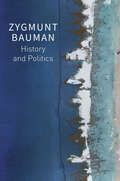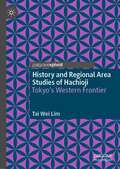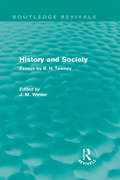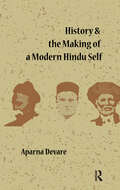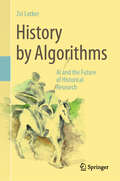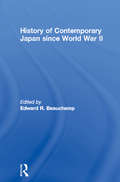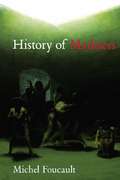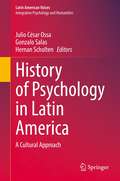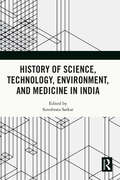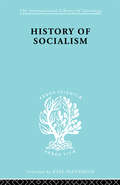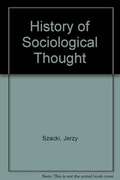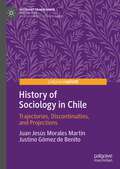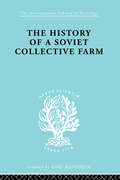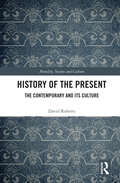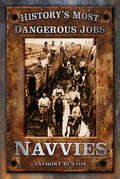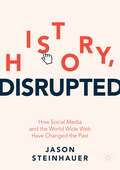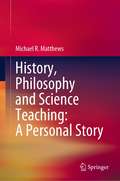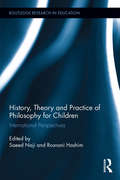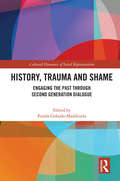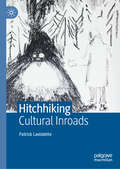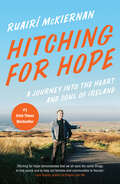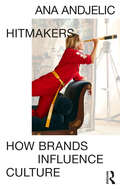- Table View
- List View
History and Politics: Selected Writings, Volume 2
by Zygmunt BaumanA victim of the Nazis, then the communists. Twice a refugee, yet always remaining a committed socialist. In countless ways, Zygmunt Bauman lived the political upheavals of the twentieth and twenty-first centuries. He was an actor within them. Bauman’s own lived history informed his politics, which found expression in varying degrees in his sociology, as he wrote extensively on socialism, democracy, bureaucracy, morality, Europe and the Jewish experience. This volume brings together hitherto unknown or rare pieces by Bauman on the themes of history and politics by drawing upon previously unpublished material from the Bauman Archive at the University of Leeds. A substantial introduction by the editors provides readers with a lucid guide through this material and develops connections to Bauman’s other works. The second volume in a series of books that will make available the lesser-known writings of one of the most influential social thinkers of our time, History and Politics will be of interest to students and scholars across the arts, humanities and social sciences, and to a wider readership.
History and Regional Area Studies of Hachioji: Tokyo's Western Frontier
by Tai Wei LimThis book looks at the case study of Hachioji as a major transit hub with a world-class public transportation system in Japan. It tracks how Tokyo slowly expands into its suburban, rural or sub-rural districts. It also wants to profile the multiple identities of a city that is simultaneously an ecological asset, a heritage locale in addition to a logistics hub. The volume is probably the first of its kind to analyze the western sector of the largest city in the world.
History and Society: Essays by R.H. Tawney (Routledge Revivals)
by R.H. TawneyR. H. Tawney believed that the subject of economic history raises questions which touch the fundamental concerns of all thinking people. By setting economic development firmly within the framework of cultural and political life, he provided an alternative to the recent fragmentation of economic history into a number of increasingly technical specialisms. First published as a collection in 1978, these ten essays, spanning the length of Professor Tawney’s career remain as controversial and potent as ever, and the original introduction by J. M. Winter provides the first full evaluation and significance of R. H. Tawney’s approach to economic history. Among the essays included in this volume are the indispensible studies of ‘The Rise of the Gentry’ and ‘Harrington’s Interpretation of His Age’, as well as ‘The Abolition of Economic Controls, 1918-1921’, here published in full for the first time. Other selections, such as Tawney’s celebrated inaugural lecture as Professor of Economic History at the London School of Economics in 1933, ‘the Study of Economic History’, offer a representative sample of the range and sweep of Tawney’s historical imagination. Taken together, these essays demonstrate the validity of Tawney’s conviction that economic historians must confront not only the creation of wealth, but also the moral questions surrounding its distribution.
History and the Making of a Modern Hindu Self
by Aparna DevareTaking the contentious debates surrounding historical evidence and history writing between secularists and Hindu nationalists as a starting point, this book seeks to understand the origins of a growing historical consciousness in contemporary India, especially amongst Hindus. The broad question it poses is: Why has ‘history’ become such an important site of identity, conflict and self-definition amongst modern Hindus, especially when Hinduism is known to have been notoriously impervious to history? As modern ideas regarding notions of history came to India with colonialism, it turns to the colonial period as the ‘moment of encounter’ with such ideas. The book examines three distinct moments in the Hindu self through the lives and writings of lower-caste public figure Jotiba Phule, ‘moderate’ nationalist M. G. Ranade and Hindu nationalist V. D. Savarkar. Through a close reading of original writings, speeches and biographical material, it is demonstrated that these three individuals were engaged with a modern historical and rationalist approach. However, the same material is also used to argue that Phule and Ranade viewed religion as living, contemporaneous and capable of informing both their personal and political lives. Savarkar, the ‘explicitly Hindu’ leader, on the contrary, held Hindu practices and traditions in contempt, confining them to historical analysis while denying any role for religion as spirituality or morality in contemporary political life. While providing some historical context, this volume highlights the philosophical/ political ideas and actions of the three individuals discussed. It integrates aspects of their lives as central to understanding their politics.
History by Algorithms: AI and the Future of Historical Research
by Zvi LotkerThis book offers a first step towards getting machines to understand history in terms of analysing historical narratives. It uses computational intelligence and history texts as keys to ask different questions than have been asked about our human history so far. The book is divided into three main parts. The first part discusses the mathematical language of history, the second part uses simple models to analyse historical laws written in mathematical language, and the third part discusses the impact of general Large Language Models (LLMs) on the study of history.
History of Chinese Imperial Examination
by Liu Haifeng Li BingThis book is a comprehensive and systematic exposition of the history of the emergence, development, and evolution of Chinese imperial examination system. It gathers the author’s insights from over thirty years of research on the history of the imperial examination and can be regarded as a summary work on the study of imperial examination history in China. It follows the historical sequence, taking the development and evolution of the imperial examination as the warp, and the characters, events, activities, and thoughts as the latitude. It not only narrates the history of the imperial examination system, but also pays attention to the actual operation of the imperial examination system. At the same time, it takes into account the historical development of examination thought. And during narration, it focuses on the interaction and interdependence between people and the system, as well as their interactive influence. Therefore, it is both academic and readable.
History of Contemporary Japan since World War II (Dimensions of Contemporary Japan)
by Edward R. BeauchampThe best scholarship on the development of contemporary Japan This collection presents well over 100 scholarly articles on modern Japanese society, written by leading scholars in the field. These selections have been drawn from the most distinguished scholarly journals as well as from journals that are less well known among specialists; and the articles represent the best and most important scholarship on their particular topic. An understanding of the present through the lens of the past The field of modern Japan studies has grown steadily as Westerners have recognized the importance of Japan as a lading world economic force and an emerging regional power. The post-1945 economic success of the Japanese has, however, been achieved in the context of that nation's history, social structure, educational enterprise and political environment. It is impossible to understand the postwar economic miracle without an appreciation of these elements. Japan's economic emergence has brought about and in some cases, exacerbated already existing tensions, and these tensions have, in turn, had a significant impact on Japanese economic life. The series is designed to give readers a basic understanding of modern Japan-its institutions and its people-as we stand on the threshold of a new century, often referred to as the Pacific Century.
History of Madness: A History Of Insanity In The Age Of Reason (Routledge Classics Ser.)
by Michel FoucaultWhen it was first published in France in 1961 as Folie et Déraison: Histoire de la Folie à l'âge Classique, few had heard of a thirty-four year old philosopher by the name of Michel Foucault. By the time an abridged English edition was published in 1967 as Madness and Civilization, Michel Foucault had shaken the intellectual world. This translation is the first English edition of the complete French texts of the first and second edition, including all prefaces and appendices, some of them unavailable in the existing French edition. History of Madness begins in the Middle Ages with vivid descriptions of the exclusion and confinement of lepers. Why, Foucault asks, when the leper houses were emptied at the end of the Middle Ages, were they turned into places of confinement for the mad? Why, within the space of several months in 1656, was one out of every hundred people in Paris confined? Shifting brilliantly from Descartes and early Enlightenment thought to the founding of the Hôpital Général in Paris and the work of early psychiatrists Philippe Pinel and Samuel Tuke, Foucault focuses throughout, not only on scientific and medical analyses of madness, but also on the philosophical and cultural values attached to the mad. He also urges us to recognize the creative and liberating forces that madness represents, brilliantly drawing on examples from Goya, Nietzsche, Van Gogh and Artaud. The History of Madness is an inspiring and classic work that challenges us to understand madness, reason and power and the forces that shape them.
History of Psychology in Latin America: A Cultural Approach (Latin American Voices)
by Julio César Ossa Gonzalo Salas Hernan ScholtenThis book presents a cultural history of psychology that analyzes the diverse contexts in which psychological knowledge and practices have developed in Latin America. The book aims to contribute to the growing effort to develop a theoretical knowledge that complements the biographical perspective centered on the great figures, with a polycentric history that emphasizes the different cultural, social, economic and political phenomena that accompanied the emergence of psychology. The different chapters of this volume show the production of historians of psychology in Latin America who are part of the Ibero-American Network of Researchers in History of Psychology (RIPeHP, in the Portuguese acronym for "Rede Iberoamericana de Pesquisadores em História da Psicologia"). They present a significant sample of the research carried out in a field that has experienced a strong development in the region in the last decades. The volume is divided into two parts. The first presents comparative chapters that address cross-cutting issues in the different countries of the region. The second part analyzes particular aspects of the development of psychology in seven countries: Argentina, Brazil, Chile, Colombia, Mexico, Paraguay and Peru. Throughout these chapters the reader will find how psychology made its way through dictatorial governments, phenomena of violence and internal armed conflict, among others. Dimensions that include rigorous analysis ranging from ancestral practices to current geopolitical knowledge of the Latin American region. History of Psychology in Latin America - A Cultural Approach is an invaluable resource for historians of psychology, anywhere in the world, interested in a polycentric and critical approach. Since its content is part of the "cultural turn in psychology" it is also of interest to readers interested in the social and human sciences in general. Finally, the thoroughly international perspective provided through its chapters make the book a key resource for both undergraduate and graduate teaching and education on the past and current state of psychology.
History of Science, Technology, Environment, and Medicine in India
by Sarkar SuvobrataThis volume studies the concept and relevance of HISTEM (History of Science, Technology, Environment, and Medicine) in shaping the histories of colonial and postcolonial South Asia. Tracing its evolution from the establishment of the East India Company through to the early decades after the Independence of India, it highlights the ways in which the discipline has changed over the years and examines the various influences that have shaped it. Drawing on extensive case studies, the book offers valuable insights into diverse themes such as the East-West encounter, appropriation of new knowledge, science in translation and communication, electricity and urbanization, the colonial context of engineering education, science of hydrology, oil and imperialism, epidemic and empire, vernacular medicine, gender and medicine, as well as environment and sustainable development in the colonial and post-colonial milieu. An indispensable text on South Asia’s experience of modernity in the nineteenth and twentieth centuries, this book will be of interest to scholars and researchers of modern South Asian studies, modern Indian history, sociology, history of science, cultural studies, colonialism, as well as studies on Science, Technology and Society (STS).
History of Socialism: An Historical Comparative Study of Socialism, Communism, Utopia (International Library of Sociology)
by Harry W. LaidlerFirst published in 1998. Routledge is an imprint of Taylor & Francis, an informa company.
History of Sociological Thought
by Jerzy SzackiReview: "[An] encyclopedic work ranging from early social thought to twentieth-century sociological theory.... [which] should be a superb reference work for advanced undergraduate and graduate students. Its emphasis on eighteenth- and nineteenth-century thought and its extensive bibliography make this a most worthwhile book."-Choice "ÝAn¨ encyclopedic work ranging from early social thought to twentieth-century sociological theory.... Ýwhich¨ should be a superb reference work for advanced undergraduate and graduate students. Its emphasis on eighteenth- and nineteenth-century thought and its extensive bibliography make this a most worthwhile book."-Choice ?[An] encyclopedic work ranging from early social thought to twentieth-century sociological theory.... [which] should be a superb reference work for advanced undergraduate and graduate students. Its emphasis on eighteenth- and nineteenth-century thought and its extensive bibliography make this a most worthwhile book.?-Choice
History of Sociology in Chile: Trajectories, Discontinuities, and Projections (Sociology Transformed)
by Juan Jesús Morales Martín Justino Gómez de BenitoThis book provides a comprehensive overview of the rich and diverse tradition of social thought in Chile over the last century. The authors emphasize the close relationship between sociology and society, and address large issues such as the institutionalization of sociology in the face of an open modernization process following WWII, the key role played by Chile in the regionalization and internationalization of sociology and social sciences in Latin America from the late 1950s until the 1973 Coup d'état, and the radicalization of sociology and the boom of dependency theories during that time. The analysis extends to independent academic centers that kept sociological thought, social intervention and the democratic dream alive within an authoritarian context, and the role of academic and professional sociology since the return to democracy, which has been attentive to accompanying and interpreting the development of a changing Chilean society. Framed within the country's cultural, economic, historical, social and political experience, this overview of the debates, dissemination, networks, and educational programs associated with sociology, will be of interest to students and scholars of Latin American studies and historical sociology.
History of a Soviet Collective Farm (International Library of Sociology)
by Fedor BelovFirst published in 1998. Routledge is an imprint of Taylor & Francis, an informa company.
History of the Present: The Contemporary and its Culture (Morality, Society and Culture)
by David RobertsThis book explores the demise of the grand narrative of European modernity. That once commanding narrative located the meaning of the past in the present and the meaning of the present in an ever-receding future. Today, instead, the present defines both the past and the future. The ‘contemporary’ has replaced ‘modern’ and ‘post-modern’ self-understandings. The times of the past and the future have been transformed into versions of ‘now’ while the present has acquired its own history. History of the Present describes the emergence of this ‘contemporary’ historical consciousness across a wide spectrum of cultural phenomena ranging from historiography to heritage and museum studies, and from the globalization of the novel to the rise of science fiction. The culture of the ‘contemporary’ appears particularly clearly in the merging of high and low culture along with art and fashion. This book will appeal to scholars of sociology, cultural and social theory, museum and heritage studies, and literary history and criticism.
History's Most Dangerous Jobs: Navvies (History's Most Dangerous Jobs)
by Anthony BurtonThis is the story of the men who built Britain’s canals and railways – not the engineers and the administrators but the ones who provided the brawn and muscle. There had never been a workforce like the navvies, a great army of men, moving about the country following the work as it became available. This book will tell of their extraordinary feats of strength and their often colourful lives. They lived rough, usually having to make do with huts and shelters cobbled together from whatever materials were available. They worked hard and drank hard. Often exploited by their employers, they were always liable to erupt into riots that could have fatal results. The book will look at who these men were, where they came from – and destroy the myth that they were all Irish. It is a story full of drama, but above all one of great achievements.
History, Disrupted: How Social Media and the World Wide Web Have Changed the Past
by Jason SteinhauerThe Internet has changed the past. Social media, Wikipedia, mobile networks, and the viral and visual nature of the Web have inundated the public sphere with historical information and misinformation, changing what we know about our history and History as a discipline. This is the first book to chronicle how and why it matters. Why does History matter at all? What role do history and the past play in our democracy? Our economy? Our understanding of ourselves? How do questions of history intersect with today’s most pressing debates about technology; the role of the media; journalism; tribalism; education; identity politics; the future of government, civilization, and the planet? At the start of a new decade, in the midst of growing political division around the world, this information is critical to an engaged citizenry. As we collectively grapple with the effects of technology and its capacity to destabilize our societies, scholars, educators and the general public should be aware of how the Web and social media shape what we know about ourselves - and crucially, about our past.
History, Geography and Civics
by John BuchananHistory, Geography and Civics provides an in-depth and engaging introduction to teaching and learning socio-environmental education from F-6 in Australia and New Zealand. It explores the centrality of socio-environmental issues to all aspects of life and education and makes explicit links between pedagogical theories and classroom activities. Part I introduces readers to teaching and learning history, geography and environmental studies, and civics and citizenship, as well as issues in intercultural and global education. Part II explores the use of media and sources, values and attitudes, assessment and creative teaching. Each chapter provides links to the Australian Curriculum, including cross-curriculum priorities: sustainability, Aboriginal and Torres Strait Islander education, and Asia and Australia's engagement with Asia. History, Geography and Civics encourages the reader to consider their own beliefs, values and attitudes in relation to their teaching and includes provocations and reflective questions to foster discussion and engagement.
History, Philosophy and Science Teaching: A Personal Story
by Michael R. MatthewsThis book is an historical narrative of academic appointments, significant personal and collaborative research endeavours, and important editorial and institutional engagements. For forty years Michael Matthews has been a prominent international researcher, author, editor and organiser in the field of ‘History, Philosophy and Science Teaching’. He has systematically brought his own discipline training in science, psychology, philosophy of education, and the history and philosophy of science, to bear upon theoretical, curricular and pedagogical issues in science education. The book includes accounts of philosophers who greatly influenced his own thinking and who also were personal friends – Wallis Suchting, Abner Shimony, Robert Cohen, Marx Wartofsky, Israel Scheffler, Michael Martin and Mario Bunge. It advocates the importance of clear writing and avoidance of faddism in both philosophy and in education. It concludes with a proposal for informed and enlightened science teacher education.
History, Theory and Practice of Philosophy for Children: International Perspectives (Routledge Research in Education)
by Saeed Naji Rosnani HashimThis book on Philosophy for Children (P4C) is a compilation of articles written by its founders and the movement‘s leaders worldwide. These articles have been prepared in the dialogue and interview format. Part I explains the genesis of the movement, its philosophical and theoretical foundations. Part II examines the specialized uses of philosophical dialogues in teaching philosophy, morality, ethics and sciences. Part III examines the theoretical concerns such as the aims of the method in regards to the search for truth or sense of meaning, or the debate on the novel or short stories and its characteristics. Part IV explains the practices of P4C worldwide and the issue of cultural differences, the ways of the community of inquiry and the necessary adaptation to suit local concerns. The book concludes with a notable review of the progress of P4C, the obstacles, and its international spread to over 60 countries. These penetrating insights make the book an incredibly rich resource for anyone interested in or involved with implementing a P4C programme. Brave Old Subject, Brave New World Teaching Science and Morality Via P4C Showing Children can do Philosophy
History, Trauma and Shame: Engaging the Past through Second Generation Dialogue (Cultural Dynamics of Social Representation)
by Pumla Gobodo-MadikizelaHistory, Trauma and Shame provides an in-depth examination of the sustained dialogue about the past between children of Holocaust survivors and descendants of families whose parents were either directly or indirectly involved in Nazi crimes. Taking an autobiographical narrative perspective, the chapters in the book explore the intersection of history, trauma and shame, and how change and transformation unfolds over time. The analyses of the encounters described in the book provides a close examination of the process of dialogue among members of The Study Group on Intergenerational Consequences of the Holocaust (PAKH), exploring how Holocaust trauma lives in the ‘everyday’ lives of descendants of survivors. It goes to the heart of the issues at the forefront of contemporary transnational debates about building relationships of trust and reconciliation in societies with a history of genocide and mass political violence. This book will be great interest for academics, researchers and postgraduate students engaged in the study of social psychology, Holocaust or genocide studies, cultural studies, reconciliation studies, historical trauma and peacebuilding. It will also appeal to clinical psychologists, psychiatrists and psychoanalysts, as well as upper-level undergraduate students interested in the above areas.
Hitchhiking: Cultural Inroads
by Patrick LavioletteThe first English-language social science book to comprehensively explore hitchhiking in the contemporary era in the West, this volume covers a lot of ground—it goes to and fro, in an echo of the modus operandi of most hitchhiking journeys. As scarification, piercings, and tattoos move from the counter-culture to popular culture, hitchhiking has remained an activity apart. Yet, with the assistance of virtual platforms and through its ever-growing memorialisation in literature and the arts, hitchhiking persists into the 21st century, despite the many social anxieties surrounding it. The themes addressed here thus include: adventure; gender; fear and trust; freedom and existential travel; road and transport infrastructures; communities of protest and resistance; civic surveillance and risk ecologies.
Hitching for Hope: A Journey into the Heart and Soul of Ireland
by Ruairi Mckiernan#1 Irish Times Bestseller!A modern travel tale—part personal pilgrimage, part political quest—that captures the power of human resilience"McKiernan sticks his thumb out, and somehow a healthy dose of humanity manages to roll up alongside him. . . . This book is a paean to nuance, decency and possibility."—Colum McCann, National Book Award winner and New York Times bestselling author of Let the Great World Spin and Apeirogon. Following the collapse of Ireland’s Celtic Tiger economy, social activist Ruairí McKiernan questions whether he should join the mounting number of emigrants searching for greater opportunity elsewhere. McKiernan embarks on a hitchhiking odyssey with no money, no itinerary and no idea where he might end up each night. His mission: to give voice to those emerging from one of the most painful periods of economic and social turmoil in Ireland’s history. Engaging, provocative and sincere, Hitching for Hope is a testimony to the spirit of Ireland. It is an inspirational manifesto for hope and healing in troubled times.
Hitching for Hope: A Journey into the Heart and Soul of Ireland
by Ruairí McKiernanA modern travel tale—part personal pilgrimage, part political quest—that captures the power of human resilience <P><P> "McKiernan sticks his thumb out, and somehow a healthy dose of humanity manages to roll up alongside him. . . . This book is a paean to nuance, decency and possibility."—Colum McCann, National Book Award winner and New York Times bestselling author of Let the Great World Spin and Apeirogon. <P><P> Following the collapse of Ireland’s Celtic Tiger economy, social activist Ruairí McKiernan questions whether he should join the mounting number of emigrants searching for greater opportunity elsewhere. McKiernan embarks on a hitchhiking odyssey with no money, no itinerary and no idea where he might end up each night. His mission: to give voice to those emerging from one of the most painful periods of economic and social turmoil in Ireland’s history. Engaging, provocative and sincere, Hitching for Hope is a testimony to the spirit of Ireland. It is an inspirational manifesto for hope and healing in troubled times.
Hitmakers: How Brands Influence Culture
by Ana AndjelicModern brands are hitmakers. Knowing how to influence consumers through collaborations, merch, entertainment, brand codes, icons and other cultural products (and not through advertising) is a matter of strategy. In this book, world-renowned brand expert, Ana Andjelic, shows how modern brand strategy needs to be redefined as the strategy of cultural influence, how brands today influence culture, how brands should address audiences, and how the new approach to cultural hitmaking works organizationally and operationally.A cultural hit is an idea, content, or entertainment that a large number of consumers pay attention to, share and talk about. Once cultural hits become market hits, by lifting brand popularity or driving product sales, they have a strong financial return for a company. Brands are motivated to start producing as many cultural hits as possible, and these new formats replace traditional brand marketing strategies.In the book, Ana Andjelic clearly articulates the complexity of this modern brand building, and provides a set of practical examples and tools that can be used by brand strategists to produce a cultural hit.
